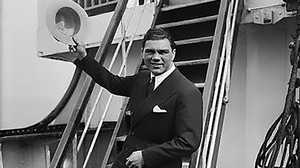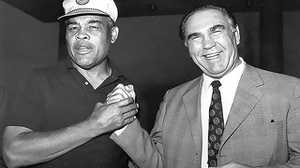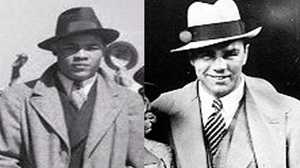Joe Louis Tribute
Pulitzer Prize-winning sports columnist Walter "Red" Smith remembered Joe Louis' strength of character in a New York Times column shortly after the boxer's death.

Joe Louis: A Sense of Dignity
By Red Smith
When Joe Louis's tax troubles were still making headlines, a man told him: "You were 15 years ahead of your time. You should have been around today to cut in on these multi-million-dollar closed-circuit shows."
"No," Joe said, "when I was boxing I made $5 million and wound up broke, owing the Government a million. If I was boxing today I'd make $10 million and wind up broke, owing the Government two million."
Joe Louis Barrow lived a month less than 67 years. He was heavyweight champion of the world in an era when the heavyweight champion of the world was, in the view of many, the greatest man in the world. He held the title for 12 years, defended it 25 times and retired undefeated as a champion.
Not once in 66 years was he known to utter a word of complaint or bitterness or offer an excuse for anything. To be sure, he had nothing to make excuses about. In 71 recorded fights he lost three times, on a knockout by Max Schmeling before he won the championship, on a decision to Ezzard Charles when he tried to regain the title, and finally on a knockout by Rocky Marciano when that young man was on his way to the top.
Joe had just celebrated his 21st birthday when he came to New York the first time. This was 1935, not a long time ago, yet some people still saw any black man as the stereotype darky, who loved dancing and watermelon. Some news photographers bought a watermelon and asked Joe to pose eating a slice. He refused, saying he didn't like watermelon.
"And the funny thing is," said Harry Markson, telling the story, "Joe loves watermelon."
At 21, this unlettered son of Alabama sharecroppers had the perception to realize what the pictures would imply and the quiet dignity to have no part of the charade. Dignity was always a word that applied to him. Dignity and candor.
Early in Muhammad Ali's splendacious reign as heavyweight champion, he hired Joe as an "adviser" and they appeared on television together.
"Joe, you really think you coulda whupped me?" Ali said.
"When I had the title," Joe said, "I went on what they called a bum-of-the-month tour."
Ali's voice rose three octaves. "You mean I'm a bum?"
"You woulda been on the tour," Joe told his new employer.
During World War II, Joe defended his championship against Buddy Baer for the benefit of the Naval Relief Fund. Wendell Wilkie, defeated candidate for President of the United States, made a resounding speech in the ring. "And you, Max Baer," he said, "and you, Joe Louee..." Earlier that day Harry Markson, then doing publicity on Mike Jacob's promotions in Madison Square Garden, offered to write a few words for Joe in case he was called on to speak. Joe said no, thanks, he wouldn't be invited.
To his surprise, he was asked to address the crowd. Unprepared though he was, he said a few altogether appropriate words, assuring listeners that we would win the war "because we're on God's side." Dignity. If memory serves, Buddy Baer wasn't called on. Before the first round ended, he couldn't speak, being unconscious.
This story has been told here before but perhaps it will bear repeating. Before Floyd Patterson's second match with Sonny Liston, the one in Las Vegas, a visitor remarked to Joe that every time Floyd talked with the press he spoke of losing. "If I lose, if I lose bad, if I'm humiliated," he would start over again at the bottom work his way back to main events.
"A fighter can't think that way," Joe said, "and he can't talk that way."
"It seems to me," his companion said, "that any time a man of intelligence goes into an athletic contest, he realizes that he stands a chance of losing."
"Oh, I think I reckanized it," Joe said. "Especially when I was just starting out and scared. After I won the title I didn't think about it no more. Oh, I knew that if I kept on fighting, some guy would come along and take the title away from me, but not this guy, never tonight."
Joe Louis may very well have been the greatest fighter who ever lived. Comparisons with Jack Dempsey and Gene Tunney and others are foolish, though there is no shadow of doubt here that he would have caught and destroyed Muhammad Ali as he caught Billy Conn and other skillful boxers.
At the top of his game he would have outboxed Rocky Marciano and perhaps have taken him out, though after 49 fights without a defeat or draw, Rocky said he had never been dazed by a punch, even the punches that floored him: Joe's aging legs betrayed him when he finally fought Marciano.
That was his last competitive match, though he boxed a few exhibitions afterwards. Marciano knocked him out of the ring in the eighth round, and afterwards Joe lay on his stomach on a rubbing table with his right ear pillowed on a towel. He wore his faded dressing gown of blue and red, with a raincoat spread over it. His left hand was in a bucket of ice on the floor and a handler massaged his left ear with ice. With his face squashed against the padding of the table, newspapermen had to kneel with their heads close to his lips to hear his words.
He said the best man had won. Asked whether Marciano could hit harder than Schmeling, who had knocked him out 15 years earlier, Joe said: "This kid knocked me out with what? Two punches, Schmeling knocked me out with -- musta been a hunderd punches. But I was 22 years old then. You can take more then than later on."
"Did age count tonight, Joe?"
"Ugh," Joe said, and bobbed his head.
— New York Times, Monday, April 13, 1981








